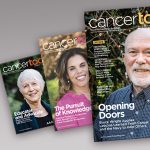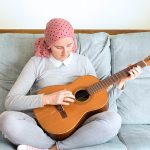-
Dealing With Immediate Medical Test Results
Patients have been entitled to immediate access to medical records and test results for three years as a result of the Cures Act. It has changed how patients and doctors share information.
by Taneia Surles
-
Empowering Pediatric Cancer Patients
After twice being treated for leukemia as a child, Brady Lucas discusses the mental impact of pediatric cancer.
by Suzanne McBride
-
Using Acupuncture and Massage to Manage Side Effects
New research finds acupuncture and massage are associated with pain reduction for patients with advanced cancer.
by Laura Gesualdi-Gilmore
-
Cancer Today Editors’ Picks: 2023
The editors of Cancer Today share the stories that most resonated with readers in 2023.
-
Your Cancer Guide
The Reality of Chemo BrainLearn ways to work through moments of fogginess and forgetfulness as you recover from cancer.
by Hester Hill Schnipper
-
Caregiving With Confidence
Falling ShortPeople feeling overwhelmed by caregiving responsibilities can help ease the burden if they learn to ask for help.
by K.J. Bannan
-
Healthy Habits
An Ocean of OpportunityA diet that incorporates fatty fish could help reduce your risk for certain cancers.
by Anne Danahy
-
Healthy Habits
Music to the EarsMusic therapy can help ease anxiety and improve quality of life for people with cancer.
by Tyler Santora
-
Sound Advice
How can my child balance cancer treatment and school?Figure out your child's goals, and then work with school staff to develop a plan.
-
Sound Advice
How can palliative care and hospice services support a person with cancer?The two concepts are closely linked and both focus on improving a patient's quality of life.
Cancer Talk
Treatment Combination Improves Survival in EGFR-positive Lung Cancer
Adding chemotherapy to targeted therapy improves outcomes for people with advanced EGFR-positive non-small cell lung cancer.
by Sandra Gordon
Lessons From 20 Years Living With CancerMultiple myeloma survivor Jonathan Gluck reflects on uncertainty, and the scientific progress that has kept him living with cancer for more than two decades.
by Eric Fitzsimmons
The Enduring Importance of Cancer Disparities ResearchOpening session from AACR conference highlights how perseverance and adversity have informed cancer disparities research over the years.
by Eric Fitzsimmons
Most Cancer Survivors Don’t Meet Healthy Diet GoalsDespite research linking fruits and vegetables to cancer survival, many people do not change their eating habits after diagnosis.
by Darlene Dobkowski















